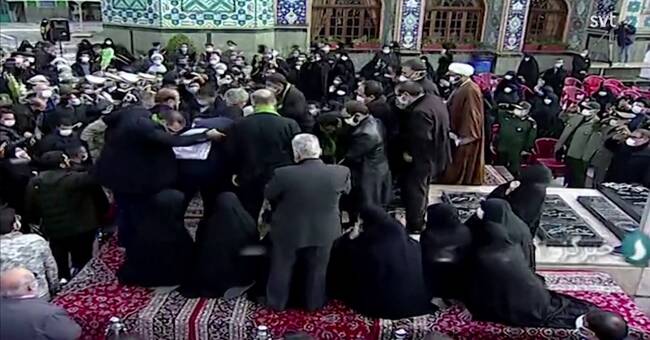The funeral in Tehran began to the tune of religious singing with allusions to historical martyrdom.
On a big screen, a picture of Fakhrizadeh was displayed next to pictures of Iran's supreme leader Ayatollah Ali Khamenei and top general Qassem Soleimani, who were killed in a US drone attack earlier this year.
The researcher was also honored this weekend in ceremonies at Shiite shrines in various cities.
Fakhrizadeh died on Friday after being seriously injured in an attack on the car he was traveling in outside Tehran.
The state news agency Fars states that the attack was carried out with the help of a remote-controlled automatic weapon mounted on a pickup.
- The attack was studied.
The enemy used a completely new, professional and specialized method and reached its goal, says Ali Shamkhani, head of Iran's Supreme National Security Council, pointing out both the opposition Iranian exile group the People's Mujahedin and the Israeli Mossad as guilty of the attack.
Bidar his time
Shortly after the assassination, President Hassan Rohani accused arch-enemy Israel of carrying out the assassination, with the support of the United States.
He has said that Iran "enough time" will demand revenge but that it will not allow itself to be incited into a "trap".
In a televised speech from Monday's ceremony, Defense Minister Amir Hatami reiterated the threat of retaliation and promised to double the budget for the work led by Fakhrizadeh.
The nuclear bomber has been singled out by Israel as the mastermind behind the attempts to build atomic bombs that Iran has been accused of.
Tehran, however, claims that it has no military intentions with its nuclear program.
Scarce comments
Following the assassination, the Iranian parliament demands that international inspections of the country's nuclear energy program be stopped, while some voices are also raised in favor of now abandoning the international disarmament and non-proliferation agreement NPT.
Few Israeli officials have commented on the assassination of Fakhrizadeh.
But Intelligence Minister Eli Cohen said in an interview on Monday that he did not know who was behind the attack.
The New York Times, however, cites a high-ranking Israeli source who suggests that the country has been involved.
"Iran's pursuit of nuclear weapons, promoted by Fakhrizadeh, posed such a threat that the world should thank Israel," the source said.
Iran has previously accused Israel of killing four nuclear scientists between 2010 and 2012.

